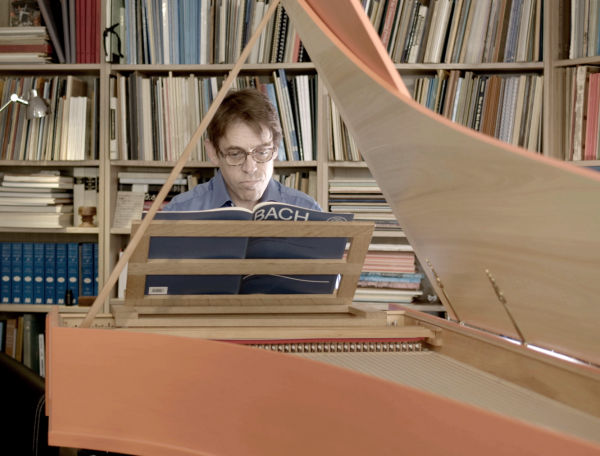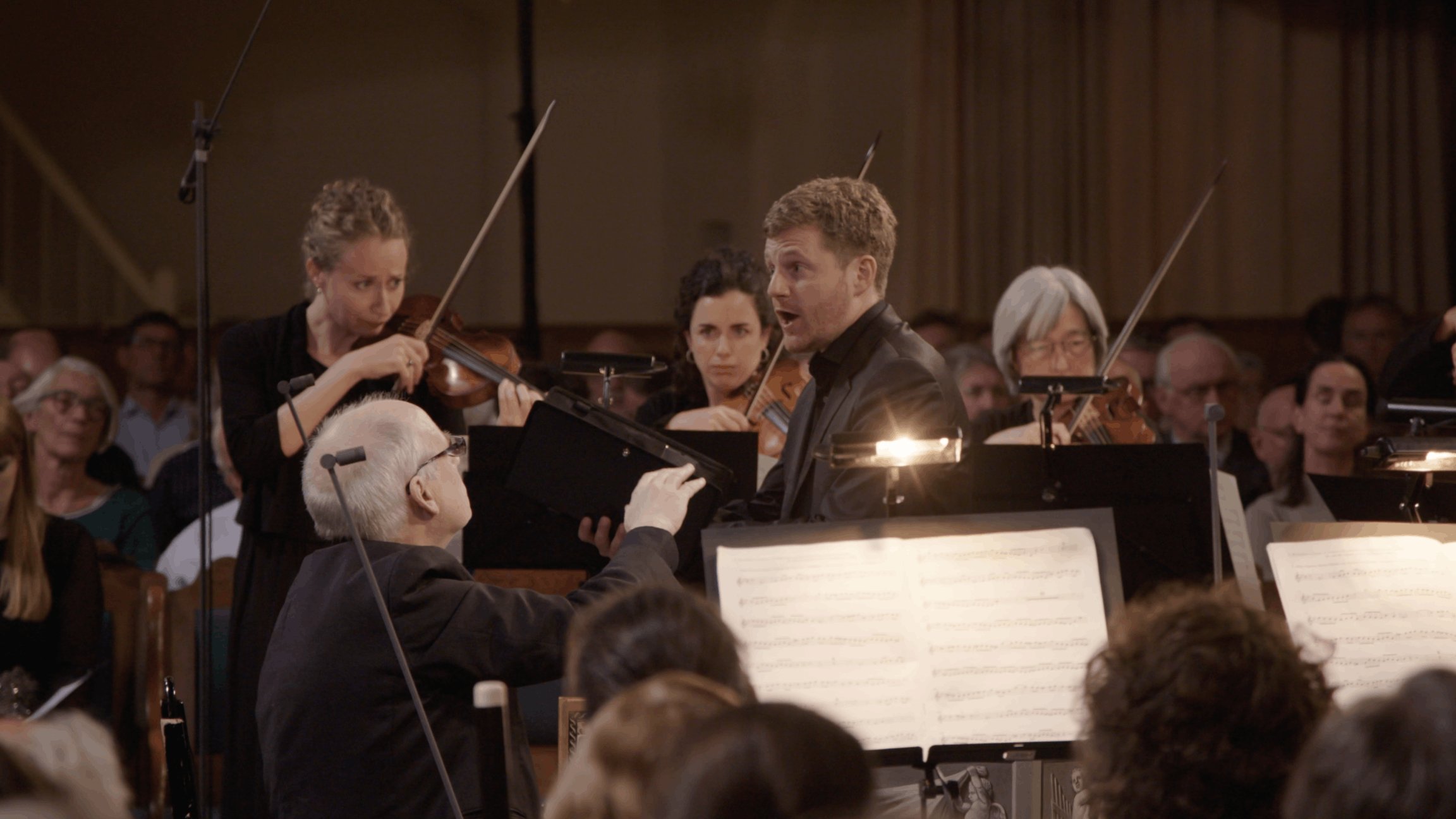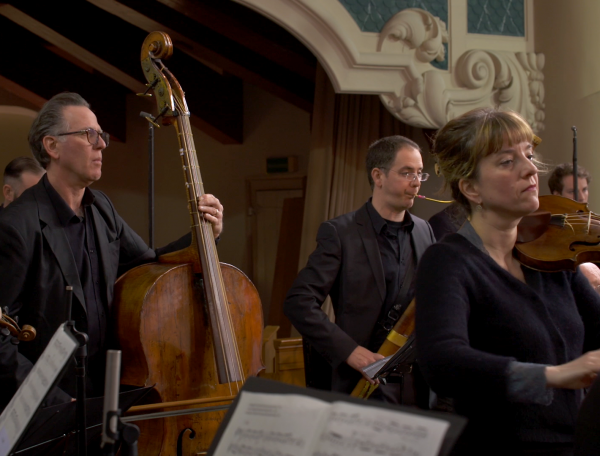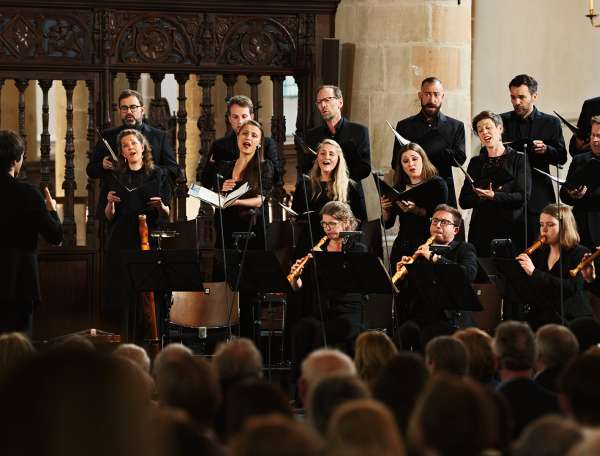

Ihr, die ihr euch von Christo nennet
BWV 164 performed by the Netherlands Bach Society
conducted by John Butt
Walloon Church, Amsterdam
Behind the music
As hard as stone
In this cantata, Bach proves himself a first-rate physician
Suffused with orthodox seventeenth-century Lutheranism, Bach’s texts sometimes sound strange to our ears. So when Bach’s music was rediscovered at the beginning of the nineteenth century, it was often the words that aroused controversy. The incomprehensible physical imagery alienated listeners, and Bach’s texts seemed to revel in gory violence. In Bach’s St John Passion, for instance, the tenor sings unflinchingly about the bruises on Jesus’s back looking like ‘the most beautiful rainbow’.
At first sight, the words of Bach’s cantata Ihr, die ihr euch von Christo nennet, BWV 164, don’t appear to be particularly alienating. The imagery of lyricist Salomo Franck concentrates on the heart; a body part that we still associate with emotion today. This corresponds well with the theme of mercy. The cantata is a particularly pious one. Through the tenor, Franck issues a reprimand to Christians straight away in the first aria, because despite Jesus’s clear message to love thy neighbour as thyself, the hearts of most Christians are ‘harder than a stone’. It gets even tougher in the subsequent recitative for bass: ‘We hear our neighbour’s sigh, he knocks upon our heart, but we turn our backs to him!’
Rather tame metaphors, you might think. But even behind Franck’s apparently everyday imagery there lurks the rich world of seventeenth-century medical science. Throughout the cantata, Franck refers to medical diagnoses that were made in Bach’s day, when your heart could literally harden and grow cold. According to the Danish-German surgeon Georg Heuermann, you risked such a dangerous condition when insufficient fluid reached your heart. But your heart was also related to emotions. If you were sad, your heart was literally depressed – the fluids gathered around your heart and pressed on it. Heuermann claimed that sighing dispelled these fluids, giving the heart room to breathe again. Another good medicine was music, which could permeate the body.
Right at the heart of the cantata, Bach proves himself a first-rate physician. In the beautiful alto aria ‘Nur durch Lieb und durch Erbarmen’, Bach expresses the sighs musically, through descending motifs in the two flute parts. The aria has an exceptionally melancholic, slightly anguished tone, while the message appears to concentrate at first on God’s love. The crux comes near the end: ‘Hearts like Samaritans are moved to sorrow by the neighbour’s sorrow’.
In the next recitative, with otherworldly accompaniment from the strings, the tenor prays for transformation: ‘Ah, with the radiance of love’s burning ray, now melt my cold heart’s steel, so that my neighbour’s anguish, whoever they may be, friend or foe, heathen or Christian, might touch my heart, as if it were my own! May my heart be loving, pure and mild.’ In the ingenious section that follows, the soprano and bass join the continuo and the high instruments in weaving an intricate tapestry filled with patterns. Motifs and phrases alternate methodically between the voices. As always, the cantata closes with a simple chorale arrangement, which is the first time we hear all the voices together.
Extra videos
Vocal texts
Original
1. Arie (Tenor)
Ihr, die ihr euch von Christo nennet,
wo bleibet die Barmherzigkeit,
daran man Christi Glieder kennet?
Sie ist von euch,
ach, allzu weit.
Die Herzen sollten liebreich sein,
so sind sie härter als ein Stein.
2. Rezitativ (Bass)
Wir hören zwar, was selbst die Liebe spricht:
Die mit Barmherzigkeit
den Nächsten hier umfangen,
die sollen vor Gericht Barmherzigkeit erlangen.
Jedoch, wir achten solches nicht!
Wir hören noch des Nächsten Seufzer an!
Er klopft an unser Herz;
doch wirds nicht aufgetan!
Wir sehen zwar sein Händeringen,
sein Auge, das von Tränen fleußt;
doch läßt das Herz sich nicht zur Liebe zwingen.
Der Priester und Levit,
der hier zur Seite tritt,
sind ja ein Bild liebloser Christen;
sie tun, als wenn sie nichts
von fremdem Elend wüßten,
sie gießen weder Öl noch Wein
ins Nächsten Wunden ein.
3. Arie (Alt)
Nur durch Lieb und durch Erbarmen
werden wir Gott selber gleich.
Samaritergleiche Herzen
lassen fremden Schmerz sich schmerzen
und sind an Erbarmung reich.
4. Rezitativ (Tenor)
Ach! schmelze doch durch deinen Liebesstrahl
des kalten Herzens Stahl,
daß ich dir wahre Christenliebe,
mein Heiland, täglich übe,
daß meines Nächsten Wehe,
er sei auch, wer er ist,
Freund oder Feind, Heid oder Christ,
mir als mein eignes Leid zu Herzen allzeit gehe!
Mein Herz sei liebreich, sanft und mild,
so wird in mir verklärt dein Ebenbild.
5. Arie (Sopran, Bass)
Händen, die sich nicht verschließen,
wird der Himmel aufgetan.
Augen, die mitleidend fließen,
sieht der Heiland gnädig an.
Herzen, die nach Liebe streben,
will Gott selbst sein Herze geben.
6. Choral
Ertöt uns durch dein Güte,
erweck uns durch dein Gnad!
Den alten Menschen kränke,
daß der neu leben mag
wohl hier auf dieser Erden,
den Sinn und all Begehrden
und Gdanken habn zu dir.
Libretto: Salomo Franck
Translation
1. Aria (Tenor)
You, who call yourselves of Christ,
where is your mercy,
by which one recognizes Christ's members?
It is, alas,
all too far from you.
Your hearts should be rich with love,
yet they are harder than a stone.
2. Recitative (Bass)
We hear, indeed, what Love itself says:
Whoever embraces his neighbor with mercy,
shall receive mercy
as his judgment.
However, we heed this not at all!
Still our neighbor’s sighs can be heard!
He knocks at our heart; it is not opened!
We observe him, indeed, wringing his hands,
his eyes, flowing with tears;
yet our heart resists the urge to love.
The priest and Levite,
that walk to one side,
are truly a picture of loveless Christians;
they behave as if they knew nothing of another’s misery,
they pour neither
oil nor wine
upon their neighbors wounds.
3. Arie (Alt)
Only through love and through mercy
will we become like God himself.
Hearts like the Samaritan's
are moved to pain by another's suffering
and are rich in compassion.
4. Recitative (Tenor)
Ah, through your love's radiance melt
the cold steel of my heart,
so that true Christian love,
My Savior, I might daily practice,
that my neighbor’s anguish,
be he whoever he is,
friend or foe, heathen or Christian,
would cut to my heart always as my own sorrow!
May my heart be loving, gentle and tender;
thus shall your image be revealed in me.
5. Aria (Soprano, Bass)
To hands that do not close
will heaven be opened.
Eyes that flow with pity
behold the Savior with grace.
To hearts that strive for love
God will give his own heart.
6. Chorale
Kill us through your goodness,
wake us through your grace!
Sicken the old being,
so that the new may live
even here on this earth,
having his mind, all desires,
and thoughts for you.
translation © Pamela Dellal
Credits
-
- Release date
- 4 Sep 2025
-
- Recording date
- 18 Sep 2024
-
- Location
- Walloon Church, Amsterdam
-
- Direction and harpsichord
- John Butt
-
- Soprano
- Carine Tinney
-
- Alto
- Alex Potter
-
- Tenor
- Julian Habermann
-
- Bass
- Matthew Brook
-
- Violin 1
- Cecilia Bernardini, Lucia Giraudo
-
- Violin 2
- Sayuri Yamagata, Annelies van der Vegt
-
- Viola
- Femke Huizinga
-
- Cello
- Albert Brüggen
-
- Double bass
- Robert Franenberg
-
- Oboe
- Rodrigo López Paz, Katharina Verhaar
-
- Traverso
- Anna Besson, Doretthe Janssens
-
- Bassoon
- Benny Aghassi
-
- Organ
- Daniel Seeger
-
- Director and editor
- Bas Wielenga
-
- Music recording
- Guido Tichelman, Pim van der Lee, Lilita Dunska
-
- Music edit and mix
- Guido Tichelman
-
- Camera
- Martin Struijf, Jesper Blok, Wesley Schipper, Tijmen Veerman, Dave Rypkema
-
- Lights
- Zen Bloot
-
- Grip
- Sander Radstaake, Jordi Kooij, Bram Galvin
-
- Assistant director
- Ferenc Soeteman
-
- Set technique
- Casper Heer, Dennis van Hoek
-
- Project manager nep
- Ron Vermeulen / Nik van Beelen
-
- Assistant music recording
- Marloes Biermans
-
- Producer concert
- Imke Deters, Stephan Esmeijer
-
- Producer film
- Lisanne Marlou de Kok
-
- This concert was realised with support from
- the Karin Strijbosch Fonds

